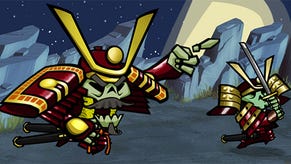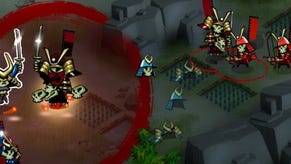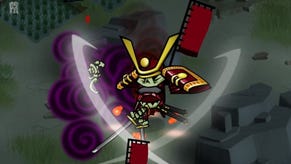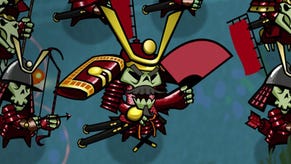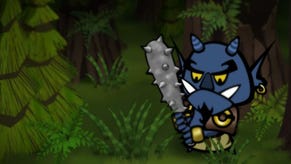Haunted Temple Talk Skulls Of The Shogun
The past couple of weeks I've been playing a preview version of the delightful turn-based strategy, Skulls Of The Shogun. It's a game about skull-eating Samurai in the after-life, and it's a tactical pleasure. I decided it might be a good idea to talk to Haunted Temple's Borut Pfeifer about the game, and you can read the chat we had, below.
RPS: Can you tell us how you came to be making Skulls Of the Shogun? What led you to that project?
Pfeifer: The three of us that compromise the core team, Jake Kazdal, Ben Vance and I, all met while working at EA in Los Angeles. Jake came from working at Sega in Japan for a long time, on Rez and Space Channel 5. Ben worked for Criterion (in Austin, Texas, although people do occasionally hear that and assume he's somehow British while speaking perfectly fluent American), until they were subsumed by EA. I worked at places like Radical and SOE before heading to LA.
There, at EALA, we went to work on a game concept by Steven Speilberg, but what really drew us was the super smart and talented team lead by Doug Church & Randy Smith. It was a great project, but eventually too ambitious for EA, and it was canceled.
We each stayed at EA for a bit. Jake worked on Command and Conquer 4 for a while, and eventually left to join Zombie as their lead production designer for Blacklight: Tango Down. I left to freelance and work on my own game. Ben stayed on a while before finally getting his golden ticket (being laid off with severance), to which I still am jealous for his patience to do so, to this day.
While I was freelancing, Jake came to me with the idea for Skulls of the Shogun. I loved the cross-genre aspects, and it dovetailed with the tech I was building for my own game, so we agreed to do SotS first. Eventually Ben came onboard after leaving EA.
Pfeifer: Well, Jake likes to tell charming and eery stories about living in Japan and visiting these spooky temples... but me personally I think it's just because he's tripped one too many times with Mizuguchi.
RPS: Can you tell us a bit about why a turn-based strategy like this interests you? Why should it interest our readers?
Pfeifer: One of the big motivators for us to make the game was the kind of multiplayer it allows. Shooters can be too intense to actually talk or say anything more than "Aaaahhh! Cover me!" while playing with your friends. Multiplayer strategy games, the relatively few there are, are usually pretty slow affairs. Skulls of the Shogun is our ideal mix of trash-talking, action, and brain stimulation.
The thing is, we're old. We've still got the impatience that comes from years of playing action-heavy games, but our thumbs are ancient and arthritic. And we've always been into strategy games of different genres, but that impatience frustrates us when we see hardcore strategy games so convoluted they simply can't be played by most people (with a reasonable attention span or low-to-moderate responsibilities in their life). I don't think that because the players aren't into that depth, it's just they're not willing to put in the time to get past the horrible interfaces.
A lot of developers see depth as the opposite of accessibility, like you can have one or the other. But to us they're the same thing - it's kind of like a zen koan, if your game is so deep no one understands it, is it really very deep at all? We wanted to incorporate deep strategy without any of the more crufty conventions of the genre.

RPS: Tell us a bit about your dev process. Who does what?
Pfeifer: There's the three of us full-time, and a handful of others helping out as necessary. DJ Makyo (of Dakini Records) is writing some music tracks for us. Sam Bird, longtime Command & Conquer sound designer, did some music tracks and sound effects for us (but is currently living the rock star lifestyle with his band The Outdoors). Dren McDonald, a sound design vet, is also helping us out with sound effects. And then there's our part-time producer Paul Schreiber, who Jake refuses to introduce to anyone as anything other than "Grampa" for reasons that have never been entirely clear.
Since we've all come from working on big-budget games, we've internalized their process of refining core gameplay first above all else, and then moving forward with creating more levels and adding secondary features. It doesn't always work for every kind of game (and when you see certain big-budget projects crash and burn, this is one of the reasons why), but it was well suited for SotS.
We did a lot of multiplayer prototyping early on - that helped us focus on really making the game fast to play and intuitive. It also helped us define differences between our game and other games in the genre. We avoided going down the rock, paper, scissors approach for some of the strategy because it just doesn't work for multiplayer - if one player has rock and another has scissors, the player with scissors has to sit there and suck it for the whole match.
So we've tried to incorporate a lot more, you know, strategy. Some of these games can almost be puzzle games where a level devolves into finding the one best solution. We wanted a lot more player expression in the different ways you can approach a fight. That way, no matter how well a player is doing there's usually a way to come back from it, making sure players have to stay on their toes even if they're winning. It makes for some pretty dramatic matches.
We've been working on it full time since last May, and part time for several months earlier.

RPS: The game defaults to 360 pad at the moment (I have one plugged in to my PC, so ok) but will it work with mouse and keyboard on PC?
Pfeifer: We intend to support a full mouse interface (as well as a touch interface for smartphones). We've put it off for a while mainly because we know we can do it - like I said, one of the biggest things we've learned from working at large studios is to tackle the riskiest problems first. So we've been working on stuff like online multiplayer, AI, and filling out all the campaign and multiplayer levels we've got planned.
We'll be taking a lot of cues from RTS games as far as the mouse interface goes. We're also trying to make sure it supports a lot of PC setups. My own graphics card is several years old so I can barely even run Magicka at 800 by 600, but I can run SotS at 1920 by 1200 - which leaves me in the conflicted state of feeling sad I can't play much Magicka, but good because I think we're on track for being able to play SotS on a wide range of PCs.

RPS: What is your plan for PC release? Beta? Demo? And when might that be?
Pfeifer: We hope to release a PC version close to the same time as we release a console version. One of the biggest problems of being such a small developer (especially coming from a big studio background where we were all used to a little more planning) is that it's difficult to nail down schedules - if one of us is sick for a week, that means the game is going to be a week late. Add to that business vagaries of executing an XBLA and/or PSN deal and we're just one tiny step away from admitting we basically have no idea. But we're aiming for a summer release.
There should be a demo available around the same time or shortly thereafter. We don't think we'll have a big beta period though. We're perfectionists, so we're a little paranoid about putting the game out there. We do a lot of playtests ourselves during development, but we kinda share Andy Schatz's outlook (for Monaco). It's certainly done well for Minecraft and even folks like Mode 7 with Frozen Synapse, so maybe we're just being unreasonably cranky and old school.
RPS: Thanks for your time.





